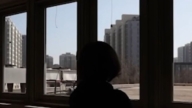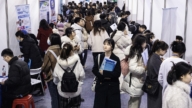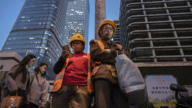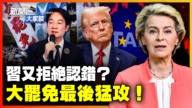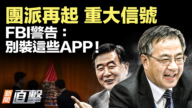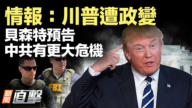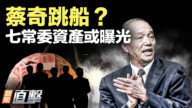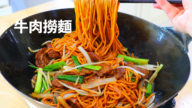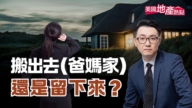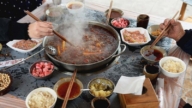【新唐人2012年1月23日讯】中共总书记胡锦涛新年在党刊《求是》发文,强调文化软实力的重要性,并指责西方对中国思想文化领域的渗透。同时,中共数家媒体在纽约大肆扩张。有学者认为,中共当局在海外斥巨资提升“软实力”的做法收效甚微,因为用共产专制文化来对抗自由民主的普世价值,显然没有感召力。
胡锦涛在《求是》上警告:要“深刻认识意识形态领域斗争的严重性和复杂性”,并声称“谁占据了文化发展制高点,谁拥有了强大文化软实力,谁就能够在激烈的国际竞争中赢得主动。”
第一个提出“软实力”概念的“哈佛大学”著名国际关系学教授约瑟夫.奈,日前在《纽约时报》发表文章–《为什么中国的软实力很微弱》。约瑟夫.奈认为,胡锦涛其实是在说中共当局受到了来自西方软实力的冲击,需要进行还击。
数家中共媒体近期在纽约的扩张似乎印证了这一点。
去年,中共喉舌《新华社》30名工作人员就已经入驻百老汇大街的办公大楼,并在“时代广场”附近点亮了公司标志视频画面。
《华尔街日报》透露,英文版的《中国日报》日前也增加在纽约业务及人力规模。而《央视》则计划在纽约和全美各地增雇62名记者。此外,《财经杂志》也来纽约扩张版图,希望能增加报导贸易顺差、汇率和纽约证交所等相关的议题。
“纽约城市大学”政治学教授夏明:“中国(中共),单一的在想像外来强加他的文化,但他把自己封闭起来,把自己同全球文化割裂开来,他跟世界文化的关系没有形成一个良性的互动,而是一种敌对的关系。所以从实践上来看,中国(中共)政府打造这个软实力基本上是没有效果的。”
约瑟夫.奈也认为,中共最近几年试图提升软实力的回报非常有限。其中一个主要原因是中共在进行软实力宣传时所说的话,和国内的真实状况不相符,如对西藏、新疆以及人权活动人士的打压,对网际网路的控制和信息封锁等。
美籍华裔作家章家敦则指出,中共近年来靠官媒花巨资在纽约扩张,以求提升软实力的做法注定不会成功。
章家敦:“他们所做的就是试图传达他们的信息,以削弱西方自由和民主在世界的传播,进而维持他们的专制独裁统治。他们在试图左右民众的看法。虽然他们花了很多钱,但是收效甚微。”
章家敦还表示,胡锦涛认为外国文化在危害中国,但是这完全是错误的,真正的问题是中共的独裁统治。因为它无法赢得人民的支持,所有的问题都变成是敏感问题,威胁则来自四面八方。
夏明认为,软实力就是一种文化感召力。共产主义意识形态随着苏联和东欧社会主义集团的崩溃,已经被历史证明是没有出路的。
夏明:“共产党现在还想从马列主义,共产主义里边找出路,一直不愿意放弃这些僵化的意识形态,同时用马列主义的教条来对抗全球的普世价值,那麽显然他是没有感召力的。”
约瑟夫.奈在评论文章的最后还说,中共在国外极力宣传的做法,根本无助于提高软实力。亚洲邻国纷纷发展同美国的关系以抗衡中国,而美国的邻国比如墨西哥和加拿大,却没有利用中国以抗衡美国的意图,就说明了这点。
新唐人记者秦雪、李明飞、王明宇采访报导。
Huge Chinese Regime Investment on Soft Power Gains Little.
The Chinese regime’s official journal “Seeking the Truth”
published an article by President Hu Jintao.
In it, he emphasizes the importance of “cultural soft power.”
He also criticized that “international hostile forces are
stepping up to westernize China."
Meanwhile, several officials Chinese Communist
Party (CCP) media are expanding rapidly in New York.
Some scholars believe that for all its efforts, the CCP has had
a limited return on its investment on increasing soft power.
It can’t rally any support if it uses the methods of an autocratic
regime, against universal values of freedom and democracy.
In the CCP official journal “Seeking the Truth”, Hu Jintao
gave a warning.
“It’s very critical to fully understand the importance and
complexity of the battles in the field of ideology”.
“Whoever dominates cultural development has the super soft
power, and gains initiative in fierce international competition.”
Joseph Nye, renowned Harvard University professor,
originally proposed the concept of “soft power”.
Recently Joseph published an article in New York Times with
the title “Why China Is Weak on Soft Power”.
Joseph thinks Hu was essentially saying that China was under
assault by Western soft power, needing to fight back”
The fact that several CCP Media are expanding in NYC
confirms the point made by Joseph Nye.
In 2011, 30 staff from “Xinhua News Agency” established an
office on Broadway Street.
The company logo of “Xinhua News Agency” is lit up on
the video screen in Time Square.
“Wall Street Journal" disclosed that the English Version
of “China Daily” is also expanding.
CCTV is planning to recruit 62 more reporters in New York
and all over the United States.
In addition, “Finance Magazine” also landed in NY.
It is expecting to increase the reporting on the subjects of
trade surplus, exchange rates and New York Stock Exchange.
Xia Ming, Political Science Professor at the City University
of New York commented.
“China Communist Party only tries to enforce its own culture,
but isolates itself from the global culture.
Therefore, its relationship with global culture is not a positive
interaction, but a hostile confrontation.
Practically, the ‘soft power’ of the CCP cannot go far.”
Joseph Nye also believes that for all its efforts, China has had
a limited return on its investment.
What China does not seem to appreciate is that using culture
and narrative to create soft power is not easy when they are inconsistent with domestic realities,
such as the crackdown in Tibet and Xinjiang, and
on human rights activists. This undercuts its soft power gains.
Writer Gordon Chang (Zhang Jiadun) highlights another point.
The CCP is destined to fail in it’s huge investment to expand
it’s media in New York in order to improve it’s soft power.
Gordon Chang: “What they try to do is to convey their own
message so as to cut off propagation freedom and democracy.
Thus, they are maintaining their autocratic regime.
They try to influence people’s point of view. With a huge
amount of investment, the gains are little.
Gordon Chang also said that it’s totally wrong if Hu thinks
foreign culture puts China at risk.
The real problem is the autocratic regime of the CCP.
Because the autocratic regime cannot get people’s support,
all issues are becoming sensitive.
The threats on the regime come from all directions.
Xia Ming believes that soft power is the power from culture
that can rally people’s support.
With the collapse of the Soviet Union and Eastern Europe,
Communist ideology has already proved it can’t succeed.
Xia Ming: “Until now the CCP still tries to find a way out
from Marxism-Leninism and communism.
It still doesn’t want to give up these rigid ideologies.
When they use the dogmatism of Marxism-Leninism against
universal values, they are not able to gain any support.
At the end of his article, Joseph Nye also said that the way
the CCP tries to increase its soft power isn’t effective.
For example, compared with how Asian countries seek
American presence to balance China,
Canada and Mexico do not seek alliances with China
to balance American power.
NTD reporters Qin Xue, Li Mingfei and Wang Mingyu


